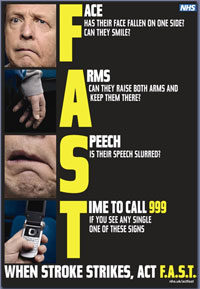In support of Stroke Awareness Month, the CWU’s Health, Safety & Environment Department has circulated information in partnership with the Stroke Association to all of it’s branches across all of the industries in which it has members.
The letter to branches (LTB327/13) was issued on 15th May and includes an attachment in the form of advice from The Stroke Association on preventing a stroke, which can be downloaded via this website’s E-Library Database
 The LTB opens with a warning about the risk of a stroke from having High Blood Pressure:
The LTB opens with a warning about the risk of a stroke from having High Blood Pressure:
Many people have high blood pressure and are unaware of it, putting them at risk of a stroke unless they make changes to their lifestyle and seek medical attention.
The message is 'get tested'. The GP Surgery or Medical Centre can perform a simple Blood Pressure test in minutes and the result could avoid a damaging, life changing Stroke with simple advice and medication.
We want Branches and Health and Safety Reps and First Aiders to help with raising awareness amongst members and 'signposting' members to where they can get the advice and assistance to hopefully avoid a Stroke.
Further advice is supplied in describing just what a stroke is and the symptoms which are associated with having had a stroke:
A stroke is a serious medical condition that occurs when the blood supply to part of the brain is cut off.
Strokes are a medical emergency and prompt treatment is essential because the sooner a person receives treatment for a stroke, the less damage is likely to happen.
If you suspect that you or someone else is having a stroke, phone 999 immediately and ask for an ambulance.
The main symptoms of stroke can be remembered with the word FAST: Face-Arms-Speech-Time.
Face – the face may have dropped on one side, the person may not be able to smile or their mouth or eye may have dropped
Arms – the person with suspected stroke may not be able to lift one or both arms and keep them there because of arm weakness or numbness
Speech – their speech may be slurred or garbled, or the person may not be able to talk at all despite appearing to be awake
Time – it is time to dial 999 immediately if you see any of these signs or symptoms
But what is the risk of having a stroke and at what age does your risk increase?
The LTB attempts to answer these questions too:
 Every year, around 150,000 people in the UK have a stroke. That’s one person every five minutes. Stroke is the third most common cause of death in the UK.
Young people can have strokes even children
Every year, around 150,000 people in the UK have a stroke. That’s one person every five minutes. Stroke is the third most common cause of death in the UK.
Young people can have strokes even children
Although most people who have a stroke are older, around a quarter of strokes happen to younger people and children. It is estimated that over 20,000 people under 65 have a stroke every year, and even babies can have a stroke.
Although men have a higher risk of stroke, women are one and a half times as likely to die from stroke as men.
Middle-aged women are also at an increased risk of having stroke than men within the same age group.
People of South Asian or African-Caribbean origin in the UK are at increased risk of stroke. For example, people of African-Caribbean origin are twice as likely to have a stroke as people of European origin, and they also tend to have their first stroke at a younger age.
Preventing Stroke
You can reduce your risk of stroke. Your chances of having a stroke reduce if you understand the risks and take action to prevent a stroke happening.
There are many factors that can increase your risk of stroke, including:
*Your genes
*Your age
*Your diet
*Your alcohol intake
*Your fitness levels
*Your smoking habits
*Your overall health and whether you have any other medical conditions.
But there are simple lifestyle changes you can make to reduce the risk of stroke.
Making changes to your lifestyle to make it healthier can reduce your risk of having a stroke. But there are some risk factors that you cannot change:
Your gender , Your age, Your ethnic background
Further advice can be found in the full Letter To Branches and in a leaflet from The Stroke Association, both of which are available to download from the E-Library Database using the search keyword ‘stroke’.
Source: CWU / Stroke Association



